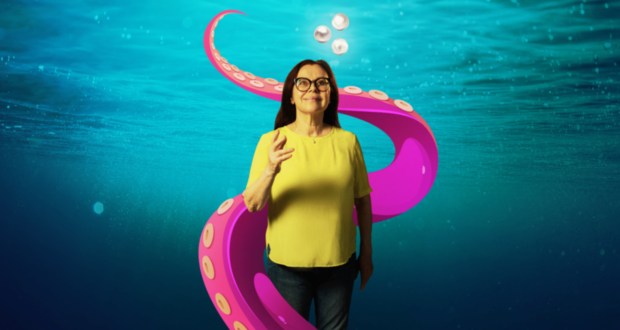A stunningly clever hybrid of intimate drama, film and gameplay, offering a comprehensive understanding of the dangers of online gambling.Summary
Rating
Excellent
Felicity (Fiona Watson) is retiring after years as a dedicated GP, mother and grandmother. Making this life change, and suddenly with time to herself, she is lured into the attractive world of online gambling. Soon, she develops an insidious addiction, which threatens to bring down her whole world.
In true Dante or Die style, Odds On is a deceptively complex yet effective piece of drama, commissioned by The Lowry and Lighthouse Poole. In fact, they have researched it extensively, consulting people with lived experience of gambling harm as creative advisors.
This is so much more than a filmed play: it’s a clever hybrid of intimate drama, film and gameplay. The production opens as a playable, interactive video game, encouraging the viewer to actively participate in Felicity’s gambling experience. It asks for your name. You give it. You choose an avatar. You are told to spin and watch the adorable fishies turn as fun music plays. When you win you are rewarded with approval, congratulations – and virtual cash. This undemanding fun makes it easy to comprehend how behaviours are manipulated and make someone play repeatedly.
The filmed segments of the show are (surprisingly!) created using an iPhone, with impressive results. This technology links into Felicity’s normality; her phone being ever-present, switched on and powerful. We sometimes view her from behind the screen, reflecting how she is constantly monitored by the game. When the ‘helpline’ messages to ‘make sure she’s OK’ it’s almost Pavlovian for her to respond, especially when the friendly but faceless assistant offers bonuses that seem great but are actually virtual and valueless.
Watson is excellent as Felicity, her performance stretching convincingly from a confident woman to someone desperate, on the brink of disaster. It’s an unexpected choice to portray the addict as a responsible older woman, au fait with technology and with a loving family, but this highlights a genuine societal problem and boldly identifies how gambling addiction can happen to anyone.
As Felicity becomes ensnared in the game’s fantasy undersea world the action brilliantly shifts from live performance into that stunningly colourful animated realm. She is submerged beneath her deception, becoming isolated, hiding truths, and repeatedly tempted into deep financial loss. Switching to the real world, the camera uses intimate, poignant close-ups to place us alongside her as she struggles to cope: her distress is almost tangible.
The compulsory gameplay means the viewer becomes locked in like Felicity, unable to progress with the story unless they continue to press buttons. There’s a striking crossover moment between fact and fantasy when the game explicitly tells the viewer that they are interacting with a bit of computer code, programmed to respond, and not a human. Any sensible person has this knowledge, but clearly someone can still be sucked in by manipulative algorithms offering what they want to hear.
The story identifies the important role of the family in addiction. Felicity’s children don’t recognise her needs as her life changes, leaving her lonely and isolated. She turns to gambling for interaction and validation, but the stakes rise too high. Compulsion leads to lying, mental instability, debt and extreme risk, and the environment of deceit makes it difficult to seek help.
The film ends very positively, back in the real world, with a message that things can be turned around with the right support. Having explored and illuminated the features of gambling addiction, the production further offers viewers a support pack and links to specialist help groups. Clearly, investing in people rather than betting is expenditure with the greatest reward, and this remarkable piece of work brilliantly promotes that.
Commissioned by: The Lowry, Salford & Lighthouse, Poole
Written & Directed by: Daphna Attias & Terry O’Donovan
Animation Director & Editor: John Brannoch
Produced by: Dante or Die
Odds On is available free online until 6 December. Further information can be found here.
 Everything Theatre Reviews, interviews and news for theatre lovers, London and beyond
Everything Theatre Reviews, interviews and news for theatre lovers, London and beyond




One comment
Pingback: Interview: Bringing passion in prison to the stage - Everything Theatre